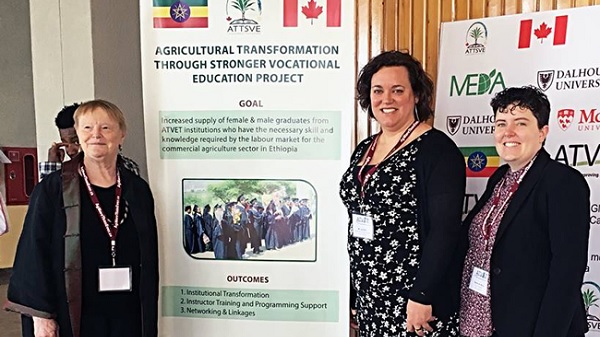
A research project by McGill University professors aims to promote gender equity and gender mainstreaming, and to combat gender-based violence within the Agriculture Technical Vocational Education and Training (ATVET) system in Ethiopia.
MONTREAL, (McGill Reporter)–Two ongoing research projects led by Professors Claudia Mitchell and Lisa Starr, of the Faculty of Education’s Department of Integrated Studies in Education (DISE) at McGill University in Montreal, Canada, are helping to understand how women in Ethiopia can empower themselves to protect their human rights, and to benefit equitably from development in the country.
Mitchell and Starr are currently carrying out a study of gender-based violence on the campuses of four Agriculture Technical Vocational Education and Training (ATVET) colleges in Ethiopia. Building on a survey as well as a college-based participatory analysis of the data, the study, funded by Global Affairs Canada, is part of a larger project: ATTSVE (Agricultural Training Through Stronger Vocational Education).
In keeping with Canada’s new Feminist International Assistance Policy, which has as its main focus of programming efforts for Global Affairs Canada to promote gender equality, this component of ATTSVE aims to promote gender equity and gender mainstreaming, and to combat gender-based violence within the ATVET system. Their projects have placed two interns in the field in Ethiopia this summer: Hani Sadati, doctoral student in DISE, and Adrianna Lemieux, undergraduate student with McGill’s Faculty of Arts.
The Agricultural Training Through Stronger Vocational Education (ATTSVE) project (Dalhousie, McGill University, Jimma University and MEDA) is working with staff from colleges in Maichew, Nedjo, Wolaita Soddo, and Woreta. The six-year project aims to help move Ethiopia towards a market-focused agricultural system better poised to support the country economically, while meeting the needs of both male and female farmers and youth, and the agriculture industry.
SEMONEGNA ON SOCIAL MEDIA: Facebook| Twitter| Instagram| Pinterest
Agriculture forms the base of the East African country’s economy. The most populous landlocked country in the world, Ethiopia’s 88 million inhabitants rely on agriculture for 80 per cent of their total employment and 84 per cent of their exports, while agriculture accounts for only half of their gross domestic product. Soil degradation, overgrazing, deforestation and poor infrastructure are contributing factors.
Read the complete story at McGill Reporter
——
See also:
- Strong Coffee, Stronger Women
- Ending Child Marriage and FGM in Ethiopia
- Worldwide Fistula Fund Works to Restore Dignity to Injured Women
- Great Ethiopian Run Launched the 14th Edition of “Women First” 5km Race
- The Yellow Movement: Ethiopian Women Use Valentine’s Day to Promote Girl Power

Hello, I am Lamrot graduate student of jimma university agricultural facility. I am rely interested in your study and science I am doing my thesis currently i would like to follow your ongoing research. Thank you!
Dear Lamrot,
Thank you for contacting Semonegna.com. We hope that you will complete your education & graduate successfully soon. We (Semonegna.com) do not have a direct communication with employers or hiring organizations. Whenever such organizations have opening and send us the info, we post it either here on our website or on our social media platforms. Thank you and good luck.